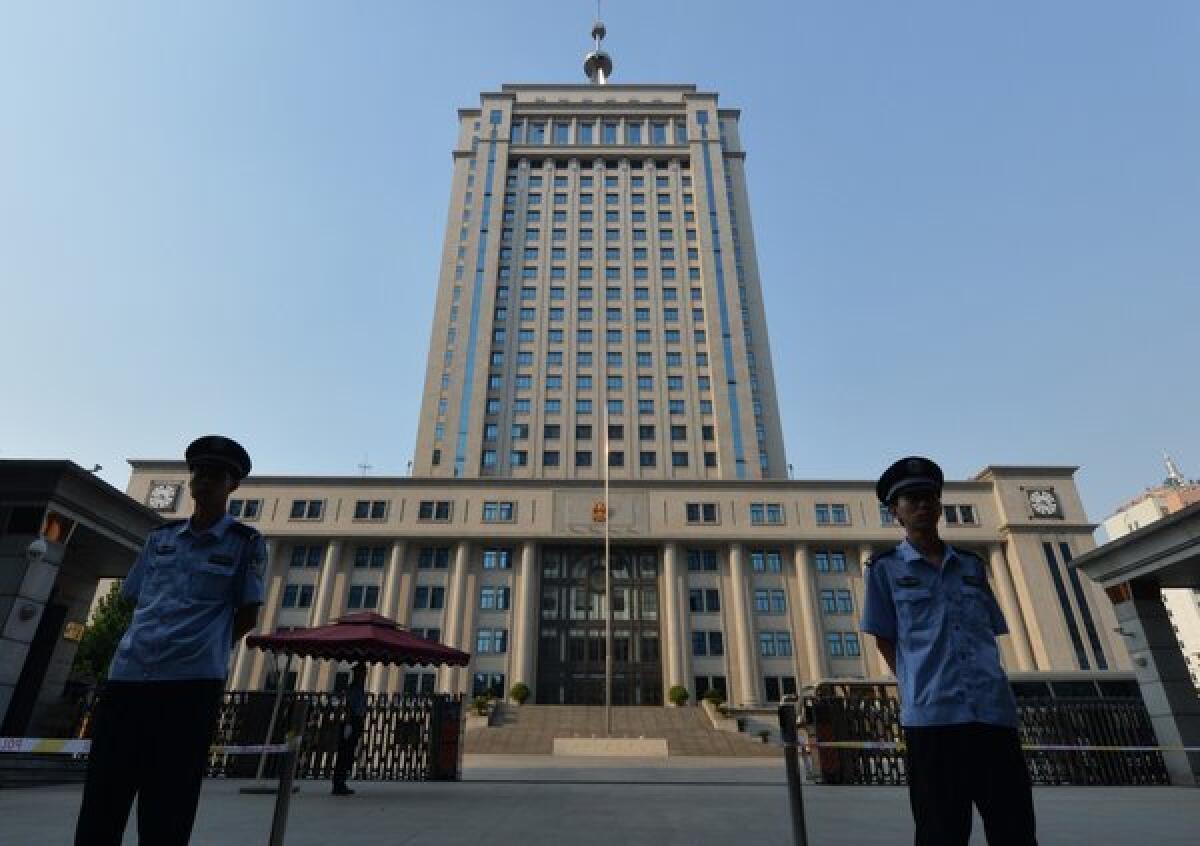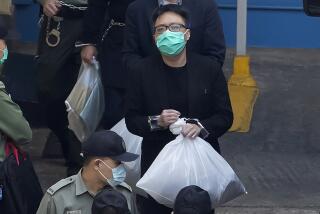Bo Xilai trial draws comparisons to China’s greatest courtroom drama

JINAN, China -- In 1980, hundreds of millions of Chinese people gathered around communal televisions set up in schools and on basketball courts, mesmerized by the trial of Mao Tse-tung’s widow and members of the so-called Gang of Four who had led the nation’s catastrophic Cultural Revolution.
The trial of purged Chongqing Communist Party leader Bo Xilai, which opened Thursday in Jinan People’s Court, draws inevitable comparisons to what was undoubtedly the greatest courtroom drama in 20th century China.
Until his downfall last year, Bo was one of the most visible and envied figures in Chinese politics. His purge coincided with the rise of rival Xi Jinping, now China’s president, and is widely perceived here as his comeuppance for challenging Xi’s ascension as head of the Communist Party.
The Chinese legal system is as much on trial in the upcoming proceedings as is Bo himself, with a guilty verdict seen as a virtual certainty (98% of Chinese defendants are convicted). Less certain is whether the government will live up to its promises of giving the 64-year-old Bo a fair trial.
Zhang Sizhi, the lawyer who represented Jiang Qing, Mao’s widow, in the 1980 trial, is not optimistic.
“Frankly, our legal system stalled 30 years ago and has not progressed since the time of the Gang of Four. The problems now are the same as then – the system is not separate from the Communist Party,’’ said Zhang, now 85 and active in the human rights community.
The day before Bo Xilai’s trial was to begin, it remained unclear how much would even be open to public scrutiny.
The Jinan court promised it would post live updates on Sina Weibo, a Twitter-like messaging service, of the transcript starting from the opening session.
“All Weibo users should watch together!’” Sina urged Wednesday in a posting with the hashtag #Bo Xilai open trial.#
Phoenix Television, a Hong Kong-based network that enjoys semiofficial status on the mainland, announced Monday night on its website that it would be televising a live feed in a nearby hotel for journalists, but the announcement was deleted by the next day. As of Wednesday afternoon, Phoenix employees said they were not yet certain what would happen.
Human rights lawyers said they were doubtful there would be much public access.
“This is just a theatrical play with a script written in advance and predetermined results,” said Liu Xiaoyuan, a Beijing lawyer who once represented dissident artist Ai Weiwei. He predicted “they will use every excuse to keep it from being open.”
The trial is being held 250 miles south of Beijing in Jinan, the capital of Shandong province. But people have traveled from throughout China out of curiosity over the political spectacle, and crowds, including protesters, began gathering Wednesday outside the well-fortified courthouse.
“Of course we are disappointed that we can’t get inside to see what’s happening,’” said Yuan Rongming, 50, who had come from Shanghai. “People should have the right for a fair trial, the same as they should have the right to vote for their government.”
In 1980, the Gang of Four trial was widely mocked in the West as a political show trial in which then-leader Deng Xiaoping purged his enemies. (A famous cartoon at the time by the Milwaukee Journal’s Bill Sanders was captioned, “Lights! Camera! Action! Bring on the guilty parties!”)
There are many differences between the 1980 trial and the current proceedings, but, if anything, it is the long ago trial that is likely to prove more transparent.
The charges against the Gang of Four (in fact, there were 10 defendants) were published in the form of a 20,000-word indictment. So far, all that has been published of the charges against Bo are a 250-word story July 25 from the New China News Agency saying that he had been indicted on charges of bribery, embezzlement and abuse of power.
Nearly 900 people attended the 1980 trial, including 330 journalists. As for Bo’s trial, there appear to be only a handful of seats for the press in courtroom No. 5. (A police bus containing portable toilets was parked outside the courthouse, however, suggesting that the press corps would be cooling their heels.)
Few Chinese owned their own television sets in 1980, but lengthy excerpts were broadcast nightly, creating a spectacle that seared the national consciousness.
“It was like the greatest soap opera of all time. My high school classmates all recognized me after that,” said Zhang.
During the Gang of Four trial, there were 49 live witnesses. Although both witnesses and defendants had been carefully rehearsed, spontaneous outbursts of grief and anger deviated from the script.
“I’ve a right to protest. Shut up!” Jiang Qing screamed while one of the witnesses was testifying against her.
Recent high-profile Chinese trials have been one-day pro forma hearings without live witnesses to be cross-examined. Former railroad minister Liu Zhijun’s corruption trial June 9 lasted less than four hours.
Most ridiculed was the 2012 murder trial of Gu Kailai, Bo’s wife, who was convicted of poisoning a British expatriate. State broadcaster CCTV showed only brief snippets afterward of Gu bowing her head in court.
The scenario laid out in the trial -– that the petite Gu was able to get the 41-year-old, 6-foot tall Neil Heywood so drunk that she was able to pour cyanide down his throat – drew guffaws from the legal community.
“There was only one thing clear at the end of that trial, which was that Heywood was dead!” said lawyer Zhang.
Jerome Cohen, an expert on Chinese law at New York University, wrote in a commentary for Human Rights Watch last month that Gu’s trial and that of a former police chief, Wang Lijun, make “one appreciate the relative openness and broad publicity given to the Gang of Four trial.”
“Moreover, overall, the evidence produced and discussed in that complex and sometimes chaotic circus, although sometimes not clearly linked to the defendants, seemed credible to the public, leaving it with fewer questions than Madame Gu’s trial did,” Cohen wrote.
An often combative and divisive figure, Bo led campaigns in Chongqing to sing revolutionary songs and to fight organized crime, delighting Maoists and frightening liberals, who feared a throwback to the days of the Cultural Revolution.
But the charges against him appear to be relatively apolitical. They relate primarily to alleged corruption in the 1990s when Bo was mayor of Dalian, and not to the dramatic events in Chongqing in recent years. He does not face charges relating to the Heywood murder, but to using his position to try to silence Wang Lijun, the police chief, who ultimately blew the whistle on the case.
In an apparent attempt to appease Bo supporters, Xi has embraced a return to Maoist values in recent speeches. He was quoted Tuesday in the state press calling for the “consolidation of the guiding role of Marxism on the ideological front, and the consolidation of the common ideological base for all party members and all the people.”
ALSO:
Ex-Pope Benedict on why he resigned: ‘God told me to’
Japan may upgrade severity of Fukushima radioactive water leak
U.N. calls emergency meeting on Syria chemical weapons charges
Twitter: @BarbaraDemick
More to Read
Start your day right
Sign up for Essential California for news, features and recommendations from the L.A. Times and beyond in your inbox six days a week.
You may occasionally receive promotional content from the Los Angeles Times.






